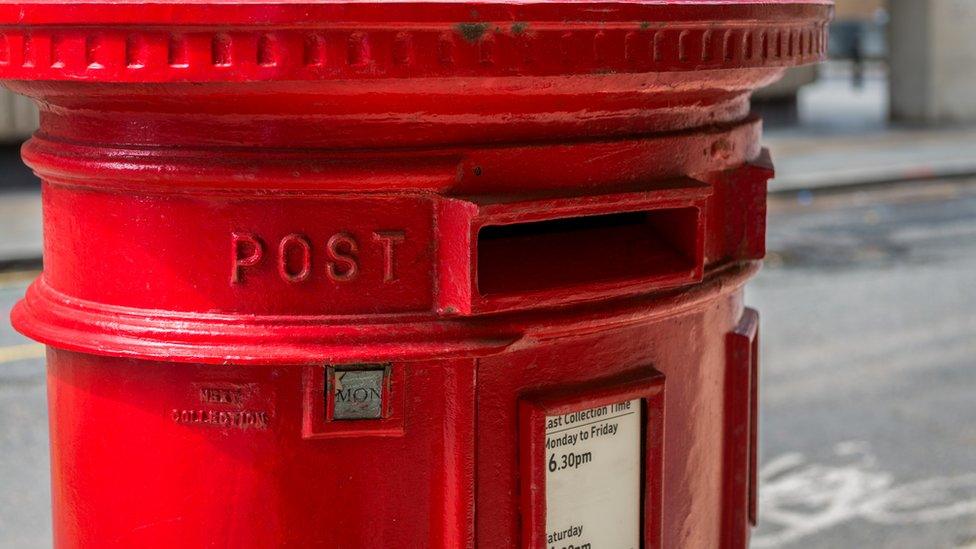Strike: Royal Mail workers strike on Wednesday and Thursday
- Published

You might notice there isn't as much post arriving over the next few days - that's because postal workers are on strike on Wednesday and Thursday.
The dispute about pay has been going on since the summer, with workers asking to be paid more as the cost of living increases.
The rate at which prices are rising, known as inflation, is running at around 11% which is the fastest pace for more than 40 years.
A spokesperson for Royal Mail said the company had made a "best and final pay offer worth up to 9% over 18 months".
The strikes come at the busiest time of year for Royal Mail when people and businesses are sending Christmas cards and presents.
The company will be relying on 11,000 managers and agency workers to fill in for more than 100,000 striking posties to try and keep things running while the strikes are going on, but said it will be "challenging".
What impact will the strike have?
Royal Mail says it will not be able to deliver first and second class letters - but will try to deliver as many parcels and Special Delivery letters as possible.
People will not be able to claim compensation for late deliveries.
Letters will not be collected from post boxes.
Royal Mail delivery offices will be closed, as will customer service points.
Post offices will be open as normal for bill payments and banking - because they are separate from Royal Mail - although some services, such as posting letters, may be affected.
The CWU also plans industrial action on 23 and 24 December.
The final suggested dates for sending Christmas post have been brought forward.
First class mail is now Friday 16 December (instead of 21 December).
Second class was Monday 12 December (instead of 19 December).
Royal Mail workers will also take industrial action on 23 December and Christmas Eve.
Some parcel companies claim the Royal Mail strike is having a knock-on effect, and forcing them to delay next-day deliveries as people and firms seek alternative ways to send their post.
Royal Mail workers voice their anger over pay and conditions
Royal Mail isn't happy about the continued strikes, and said: "Instead of working with us to agree on changes required to fund that offer and get pay into our posties' pockets, the CWU has announced plans to ballot in the New Year for further strike action."
But a spokesman for the CWU said that Royal Mail hasn't offered them a good deal, with a 3% pay rise this year, 3% next year as well as an additional 2% if employees agree to "the absolute destruction" of terms and conditions.
On Tuesday, figures from the Office for National Statistics showed that while pay had gone up on average 6.9% for people working for private companies between August and October, there was just a 2.7% increase for people working for companies like Royal Mail which are funded partly by the government.
What other strikes are going on?
There has also been disruption to railways, with workers striking on Tuesday, Wednesday, Friday and Saturday this week.
Around half of rail lines will be shut again on Wednesday, with no services at all in most of Scotland and Wales.
This is part of a long-running disagreement between unions, rail firms, the government and Network Rail over pay, job cuts and changes to terms and conditions.
Waterloo station, usually very busy with commuters travelling to London, was near deserted on Tuesday
The first-ever nationwide strike by nurses is also expected to go ahead this week.
On Friday, rail workers, buses, baggage handlers, highway workers and driving examiners will walk out.
The government's emergency Cobra committee, who meets when there is a special situation of crisis, will hold its second meeting of the week later to discuss how to minimise the impact of all these strikes.
- Published17 December 2022
- Published26 August 2022
- Published6 December 2022
